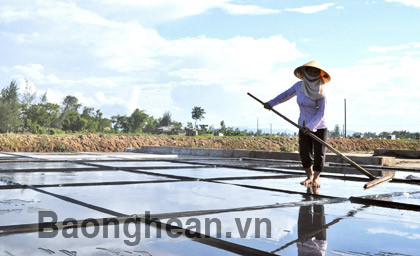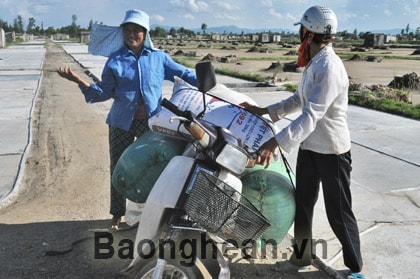Difficulties in replicating clean salt production model in Dien Chau
On the basis of increasing the application of scientific and technical advances in production, aiming to change the farming practices of salt farmers, Dien Chau Agricultural Extension Station has successfully applied the clean salt production process, initially bringing positive results, opening up new ways to increase productivity, reducing labor for salt farmers. However, replicating the model still faces difficulties.
(Baonghean.vn) -On the basis of increasing the application of scientific and technical advances in production, aiming to change the farming practices of salt farmers, Dien Chau Agricultural Extension Station has successfully applied the clean salt production process, initially bringing positive results, opening up new ways to increase productivity, reducing labor for salt farmers. However, replicating the model still faces difficulties.
Returning to Dien Van (Dien Chau) after a rainy day. In the salt fields of Van Nam Cooperative, there were few people going to the fields. Some of her people were preparing to go to other localities to sell salt. Ms. Le Thi Oanh - in Van Tai hamlet was taking the opportunity to clean the fields to prepare for a sunny day to make salt. Ms. Oanh shared: The salt industry depends a lot on the weather, so there are many additional costs. After the rain, each field must be pumped out and cleaned again. After cleaning, it is okay to see the sun, but after two or three days of sunshine and then it rains, there is nothing left.

Ms. Le Thi Oanh - in Van Tai hamlet is taking advantage of the opportunity to clean the plot after the rain.
Ms. Oanh also said: Her family made 4 crystallization cells covered with plastic tarps. Previously, to cultivate on this area, it took several workers, using a wheelbarrow to push the soil, but now it simply requires only one worker. The heaviest work in salt making is pushing the soil, but now, thanks to the application of a new production process by moving the soil to the drying yard, using plastic pipes to lead the concentrated brine from the filtering position to the settling tank to dry the salt, creating a closed and continuous production process.
According to the people's feedback, when converting to filtering, labor does not have to use wheelbarrows, so the drying yard floor increases the porosity, the salinity is higher, so the salt crystallizes faster. When the weather permits, the water can be dried continuously without the phenomenon of solidifying the juice residue like the surface of traditional lime pots. In addition, with the special location of filtering located evenly on the drying yard, it helps reduce labor by about 40-50%, women can still produce, so the labor can be reassigned.
Mr. Vu Hong Tuyen - Vice Chairman of Van Nam Cooperative said: The method of improving the production process by using plastic tarpaulin on the crystallization cell instead of the traditional lime drying yard as before not only prevents water loss but also avoids impurities mixed in the drying process to ensure safety for the clean salt production process. The project is supported by the National Agricultural Extension Center, under the guidance of the District Agricultural Extension Center, up to now, after more than 1 year of application at Van Nam Salt Cooperative, Dien Van commune has shown positive results. The plastic tarpaulin spreading model is currently only deployed at Van Nam Cooperative and has not been widely replicated due to some difficulties.
Dien Chau district has more than 170 hectares of salt-making land, mainly concentrated in the communes of Dien Van (70 hectares), Dien Kim (45 hectares), Dien Ky (16 hectares), Dien Bich (45 hectares) and Dien Ngoc (26 hectares). However, in Dien Ky commune, people only work on about 10 hectares. Dien Ngoc commune is abandoned due to the impact of the spillway discharge in Dien Thanh, so the efficiency is low. The district is planning to switch to centralized processing but there are no investors yet.

Members of Van Nam Cooperative prepare salt for sale.
Ms. Pham Thi Dao - an officer of the Department of Agriculture and Rural Development of Dien Chau said: The Provincial People's Committee has a policy to support salt farmers with 1 million VND to convert the 1 filter set to 3 improved sets; Support plastic tarpaulins to spread crystallized pepper with the rate of 3 million VND per unit, which is 60m2, salt production cooperatives are still supported according to Decision 115 of the Prime Minister on exemption and reduction of irrigation fees for salt farmers producing salt. In order to increase productivity per unit area with clean salt quality, Dien Chau is planning to strive to achieve 100% of the area applying the new method and process by 2015. However, even at Van Nam Cooperative - the place chosen as a pilot model, the replication is still difficult, not to mention other communes.
It is known that the input cost for each drying cell is a concern for salt farmers in the current salt price conditions. Talking to us, Ms. Pham Thi Sau in Van Tai hamlet is preparing goods to sell salt in Dien Bich commune, said: Her family makes 200 m of drying but she does not make the model of spreading tarpaulin because according to her, the productivity is not higher but the cost increases. Pointing to the pile of discarded tarpaulins on the shore next to her, Ms. Sau said that since January, a family that has followed the model has had to dismantle it 4 times because the quality of the tarpaulin is not guaranteed. Moreover, in the past, converting 1 cell was supported with 1 million, but now the price of materials has increased but the support has not increased, so people are not interested.
In addition, in Dien Kim commune, land has not been allocated to people for long-term salt production (re-allotted every 3-5 years), so people do not invest. This is something that the authorities need to pay attention to to help salt farmers feel secure when expanding the clean salt production model in the area.
Thu Huyen






